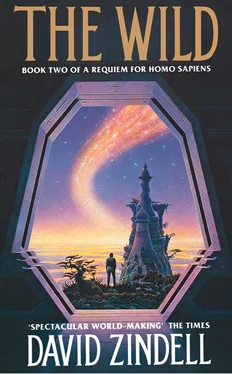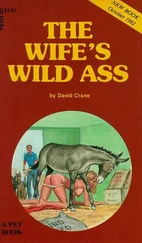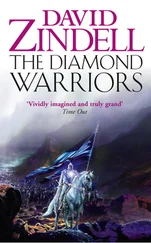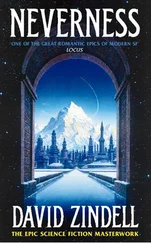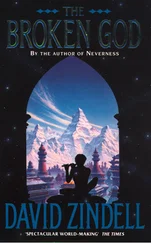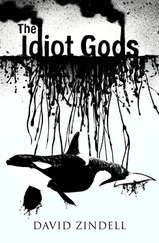David Zindell - The Wild
Здесь есть возможность читать онлайн «David Zindell - The Wild» — ознакомительный отрывок электронной книги совершенно бесплатно, а после прочтения отрывка купить полную версию. В некоторых случаях можно слушать аудио, скачать через торрент в формате fb2 и присутствует краткое содержание. Жанр: unrecognised, на английском языке. Описание произведения, (предисловие) а так же отзывы посетителей доступны на портале библиотеки ЛибКат.
- Название:The Wild
- Автор:
- Жанр:
- Год:неизвестен
- ISBN:нет данных
- Рейтинг книги:4 / 5. Голосов: 1
-
Избранное:Добавить в избранное
- Отзывы:
-
Ваша оценка:
- 80
- 1
- 2
- 3
- 4
- 5
The Wild: краткое содержание, описание и аннотация
Предлагаем к чтению аннотацию, описание, краткое содержание или предисловие (зависит от того, что написал сам автор книги «The Wild»). Если вы не нашли необходимую информацию о книге — напишите в комментариях, мы постараемся отыскать её.
The Wild — читать онлайн ознакомительный отрывок
Ниже представлен текст книги, разбитый по страницам. Система сохранения места последней прочитанной страницы, позволяет с удобством читать онлайн бесплатно книгу «The Wild», без необходимости каждый раз заново искать на чём Вы остановились. Поставьте закладку, и сможете в любой момент перейти на страницу, на которой закончили чтение.
Интервал:
Закладка:
At first, however, there was only joy. There was the cold beauty of the number storm, the many-faceted mathematical symbols that fell through his mind like frozen drops of light. There was the slowing of time and the consequent quickening of all his thoughts. And there was something else. Something other. It is something of a mystery that, although all pilots enter the manifold the same way and agree upon its essential nature, each man and woman will perceive it uniquely. For Danlo, as for no other pilot with whom he had ever spoken, the manifold shimmered with colours. Of course, in the absence of all light and spacetime, he knew that there could be no colour – but somehow, there were colours. He fell from star to star, beneath the stars of realspace, and entered a Kirrilian neighbourhood which glowed a deep cobalt blue, a hidden and secret blue the like of which he had never seen before. Soon he passed on to a common invariant space all pearl grey and touched with swirls of absinthe and rose. For a moment, he supposed that he might be lucky, that the rest of his journey toward the Entity might prove no more difficult than the straightforward mapping through such spaces. But in the Vild, piloting a lightship never remains easy or simple. Soon, in less than a moment, he entered a disorienting shear space, the kind of topological nightmare that the pilots sometimes call a Danladi inversion. Now the veils of the manifold were a bright azure, fading almost instantly to a pale turquoise, and then brightening again to an emerald green. The space all around him was like a strangely viewed painting in which figure and ground kept shifting into focus, forward and back, light and dark, inside and out. It was beautiful, in a way, but dangerous too, and so he was glad when this particular space began to break apart and branch out into a more or less normal decision tree. All pilots would wish that the manifold held nothing more complicated than such trees, where all decisions take on the simplest form: maximize/minimize, left/right, inside/outside, yes/no. So simple was this tree that Danlo had a moment to build up a proof array of the Zassenhaus Butterfly Lemma of the Jordan-Holder Theorem. (That is to say, that any two composition series of a group G are isomorphic.) He took the time to reconsider this proof of ancient algebra because he had a notion of how it might be used in an escape mapping if he should ever be so unlucky as to enter an infinite tree.
It is one of life’s ironies that most of what we fear never comes to pass, while many dangers – even killing dangers – will steal upon us by surprise. During all his time as a pilot, Danlo was to face no infinite trees. But then, just as he was leisurely defining the homomorphism, phi, the branch of the tree holding up his lightship suddenly snapped – this is how it seemed – and he was hurled into a rare and quite deadly torison space, of a kind that Lord Ricardo Lavi had once discovered on one of the first journeys toward the Vild. Suddenly, he was again very aware of colours. There were the quick violets of space suddenly folding, and the r-dimensional Betti numbers appearing as ruby, auburn, and chrome red. There were flashes of scarlet, as if all the other colours might momentarily catch on fire and fall past the threshold of finite folding into an infinite and blazing crimson. Space itself was twisting like a snowworm in a strong man’s hands, writhing and popping and twisting until it suddenly burst in an opening of violet into violet and began folding in upon itself. Now, for Danlo, there was true peril, danger inside of danger. Now – for a moment that might last no longer than half a beat of his heart – he floated in the pit of his ship, sweating and breathing deeply, and thought as quickly as it is possible for a man to think. He had little fear of death, but even so he dreaded being trapped alive inside a collapsing torison space. His dread was a red-purple colour, the colour of a blood tick squeezed between finger and thumb. He took no notice of this colour, however, nor did he give care or thought to himself. All his awareness – his racing mathematical mind and every strand of his will to live – spread out over the space before him. There were dark tunnels that kleined back and through themselves, impossibly complex, impossible to map through. There was the very fabric of the manifold itself, lavender like a fabulist’s robes, infolding upon itself through shades of amethyst, magenta, and deep purple, the one and true purple that might well be the quintessential colour that underlay all others. Everywhere, the manifold was falling in on itself like dark violet flowers blossoming backward in time, folding up petal inside petal, always infolding toward that lightless singularity where the number of folds falls off to infinity. He might never have mapped free from such a space, but then he chanced to remember a certain colour. In truth, he willed himself to summon up a perfect blue-black hue that suffused his mind the way that the night fills the late evening sky. His will to live was strong, and his memory of colours, images, words, whispers and love was even stronger. His memory for such things was almost perfect, and so it happened that he willed himself to behold a deep, deep blue inside blue, the colour of his mother’s eyes. His mother had been one of the finest scryers there had ever been, able to see the infinitely complex web of connections between nowness and time to come. The greatest scryers will always find their way into the future; in the end, they choose which future and fate will be. Although Danlo was no scryer, not yet, he remembered how perfectly the colour of his mother’s eyes matched his own. ‘You have your mother’s eyes,’ his grandfather, Leopold Soli had once told him. Long ago, before he was born, his mother had blinded herself as the scryers do so that she might perceive the future more clearly. Now, in the pit of his ship, even as he plunged downward toward the torison space’s hideous singularity, Danlo closed his eyes tightly and tried to behold their blueness from within. He remembered, then, an important theorem of elementary topology. He saw it instantly as a perfect jewel, like a lightstone, a deep, dark, liquid blue holding a secret light. It was the first conservation theorem, which proved that for every simplicial mapping, the image of the boundary is equal to the boundary of the image. Almost instantly, he seized upon this theorem as a starving man might grasp a gobbet of meat. He knew that he could apply it toward mapping out of the torison space. And so he did. Before the lens of his mind’s eye, he summoned up arrays of ideoplasts and made his proof. He was perhaps the first pilot in the history of the Order to prove that a collapsing torison space might remain open. (Even if that opening quickly fell off toward an infinitesimal.) He made a mapping, and he fell through, and suddenly there was the light of a star. The Snowy Owl fell out into realspace, into realtime, into the glorious golden light of a star that he named Shona Oyu, or, the Bright Eye. This was to be the first of the miraculous escapes from the manifold that he would make on his journey toward the Solid State Entity.
In this way, falling from star to star, falling in and out of the manifold beneath the stars, he continued on his journey. Because he wished to be the first of the ten pilots to reach the Entity (and because he hoped to elude the warrior-poet who might still be following him), he fell across the stars as quickly as a pilot may fall. As the Sonderval had said in Mer Tadeo’s garden, all quests are really the same. His quest to seek out his father and find the lost planet Tannahill was connected to the great quest twenty-five years past to find that infinite store of knowledge known as the Elder Eddas. And that quest was merely a continuation of all quests throughout time and history. Always, man had felt the urge to discover the true image of humanity, the shape and substance of what man might someday become. This is the secret of life, of human life, the true secret that men and women have sought as far back as the howling moonlit savannahs of Afarique on Old Earth. In the pilots of the Order, this urge to know the unknowable most often finds itself in a terrible restlessness, an instinct and will to fall through space, to move ever outward across the universe, always seeking. Some pilots seek black holes, or ringworlds built by ancient aliens, or strange, new stars. Some pilots still look for the hypothesized dark matter of the universe, the mysterious matter that no one has ever found. Some pilots seek God. But all pilots, if they are worthy of their pilots’ rings, seek movement for the sake of movement itself. The dance of lightship from star to star, from the translucent windows into the manifold that give out onto the stars – this urge to fall ever outward toward the farthest galaxies is sometimes called the westering. Sometimes, too, the pilots refer to this manner of journey as fenestering, for to fall quickly from star to star, one must align the stellar windows artfully and with great precision. Although Danlo was not yet a master of this art of interfenestration, the westering urge was strong in him. Westering/fenestering, fenestering/westering – to a young pilot such as Danlo, the two words were the same, and so he made successive mappings through hundreds of crystal-like windows. And with every window he passed through there was a moment of stillness and a clarity, as of starlight illuminating a perfect diamond pane. And yet there was always the anticipation of other windows yet to come, always newness, always strangeness, always the opening outward onto the clear light of universe. Falling through a window into realspace was sometimes like falling into an entirely different universe, for there was always a shift in the perception of the galaxy, and thus splendid vistas of stars never seen before. Some pilots believe that if they could fenester through an infinite number of windows, then their westering flight would eventually bring them to a place where all time and space folds inward upon itself. They call this singularity Hell, for there the manifold would become infinitely dense and impenetrable. Danlo thought of it simply as the Blessed Realm, the centre of the universe itself. Once, he had hoped to reach such a place. He remembered that this had been his reason for becoming a pilot, his passion, his love, his fate. But now he had abandoned this dream, just as he had left behind many dreams of his childhood. Now there were many windows, only they did not lead into the centre of all things but rather into the heart of a goddess. One by one, he passed through thousands of windows. They sparkled like snowflakes in an endless field, and fenestering through them was like racing on a sled over sheets of new snow.
Читать дальшеИнтервал:
Закладка:
Похожие книги на «The Wild»
Представляем Вашему вниманию похожие книги на «The Wild» списком для выбора. Мы отобрали схожую по названию и смыслу литературу в надежде предоставить читателям больше вариантов отыскать новые, интересные, ещё непрочитанные произведения.
Обсуждение, отзывы о книге «The Wild» и просто собственные мнения читателей. Оставьте ваши комментарии, напишите, что Вы думаете о произведении, его смысле или главных героях. Укажите что конкретно понравилось, а что нет, и почему Вы так считаете.
